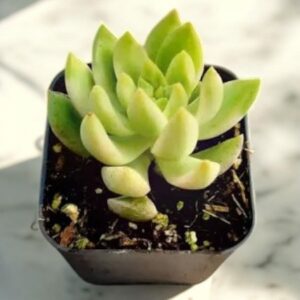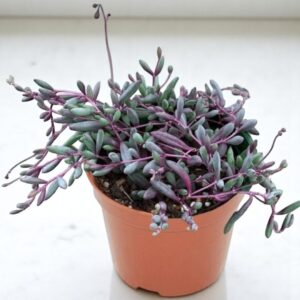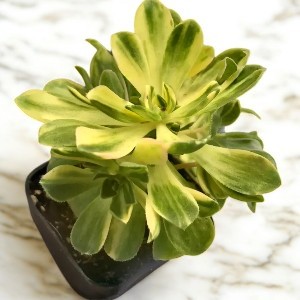Echeveria melaco ( 1 piece )
₹200.00 Original price was: ₹200.00.₹119.00Current price is: ₹119.00.
In stock
Important Notice: When replacing damaged plants, you must record an unpacking video of the package within 12 hours of delivery.
🌿 All plants are shipped bare-rooted.
Growing and caring for Echeveria melaco:?
- Light requirements: Most Echeveria varieties thrive in bright, direct sunlight. Place them in a location that receives at least 6 hours of direct sunlight per day. However, some Echeveria species can tolerate partial shade. Monitor your specific Echeveria variety to determine its light preferences.
- Temperature: Echeveria succulents prefer moderate temperatures between 60?F and 85?F (15?C to 29?C) during the growing season. They can tolerate higher temperatures but may require protection from intense heat or direct sunlight. During the winter, most Echeveria species appreciate cooler temperatures around 50?F to 60?F (10?C to 15?C) to promote dormancy.
- Watering: Echeveria plants have low to moderate water needs. Allow the soil to dry out completely between waterings, and then water thoroughly, ensuring that excess water drains out. In general, water them about once every 1-2 weeks during the active growing season (spring and summer). Reduce watering in the winter, as they enter a period of dormancy. Avoid overwatering, as it can lead to root rot.
- Soil: Echeveria succulents prefer well-draining soil. Use a cactus and succulent potting mix or create a mixture of regular potting soil, perlite, and coarse sand. Good drainage is crucial to prevent waterlogged soil.
- Fertilizer: Echeveria plants do not require frequent fertilization. During the active growing season, you can feed them with a balanced, water-soluble fertilizer diluted to half strength. Apply the fertilizer once every 2-3 months. Avoid fertilizing during the winter months when the plant is dormant.
- Propagation: Echeveria succulents can be propagated through various methods, including leaf cuttings, stem cuttings, offsets, and seeds. Leaf or stem cuttings can be taken and left to callous over before being planted in well-draining soil. Offsets, also known as pups or babies, can be gently separated from the parent plant and potted up in their own containers. Seeds can be sown in a suitable succulent mix and kept moist until they germinate.
- Pruning: Echeveria plants generally do not require much pruning. However, you can remove any dead or dried-up leaves or offsets to maintain a neat appearance. Use clean, sharp scissors or pruning shears for pruning.
- Pests and diseases: Echeveria succulents are generally hardy and resistant to pests and diseases. However, they can occasionally be susceptible to common succulent pests such as mealybugs or aphids. Inspect the plants regularly and treat any infestations promptly with appropriate pesticides or a solution of water and mild soap.
It’s important to note that specific care requirements may vary depending on the exact Echeveria variety you have. It’s always helpful to research and understand the specific needs of your particular Echeveria to ensure its optimal growth and health.
You can also visit our store to buy succulents online , buy succulent planters, buy fertilizers online with various types of indoor plants and hardy succulents . You can refer to our informational site for more details about plant varieties.Click here for agricultural knowledge information.







